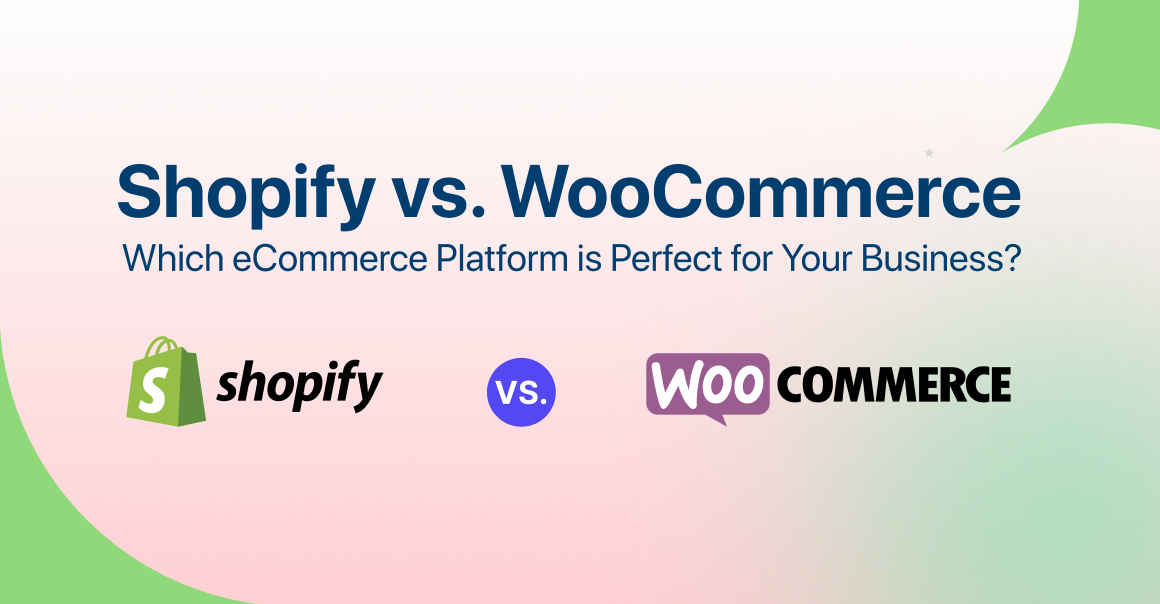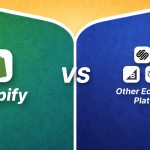Contents
In 2025, the two most popular options that are dominating the e-commerce market right now are Shopify and WooCommerce. And if you are reading this, we know you are struggling to decide between Shopify Vs. WooCommerce, which is better for your ecommerce business? But here is the thing, the right platform brings business growth, scalability and better user experience.
When we talk about an ecommerce store, the decisions you make at the initial planning of your business play an important role in shaping the future of your online shop and its success. And one of the most crucial decisions you make is selecting the right ecommerce platform to launch your online business.
So to help you understand the difference between Shopify and WooCommerce we have created this guide in which we will cover all the factors, including:
- Pricing
- Ease of Use
- Security
- Support
- Apps & Plugins
- Inventory Management
- SEO & Blogs
- Marketing Features
- Payment Gateways
- Shipping Methods
- Dropshipping
- Page Speed
- Design & Templates
Read on to learn the difference….!
An Overview of WooCommerce and Shopify
WooCommerce is an open-source e-commerce plugin for WordPress, which converts WordPress websites into online stores. It lets you sell products and services to your target audience, manage inventories, payments, customization and more. It’s a tool that turns a WordPress website into a functional e-commerce website. The platform has more than 8 million WooCommerce Checkout customers. It’s a great asset for businesses which already have a WordPress website.
WooCommerce
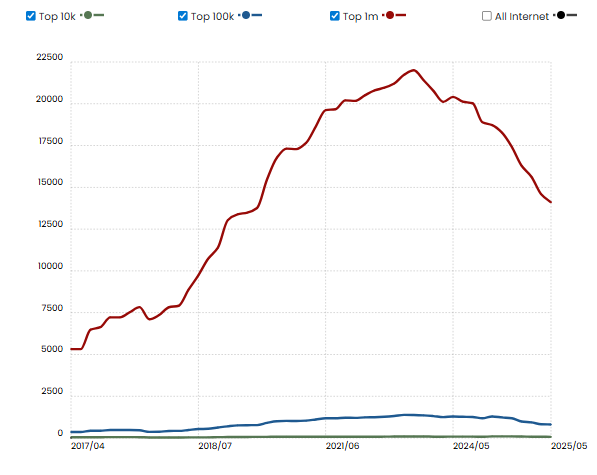
Data Source – https://trends.builtwith.com/shop/WooCommerce-Checkout
On the other hand, Shopify is an ecommerce platform that is available for all sizes of businesses. It provides hundreds of tools to build, manage and grow your eCommerce business online. With Shopify you do not need to pay extra or worry about hosting and software installation. The platform takes care of everything including website creation, payment process, marketing and much more.
We must say Shopify has its own share of popularity among ecommerce merchants. Currently it has more than 9 million stores and prediction says, Shopify is going to stay and dominate the ecommerce market for a long time.
Shopify
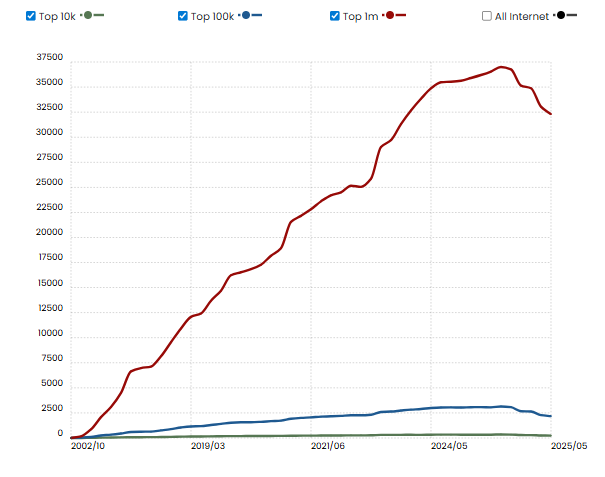
Data Source – https://trends.builtwith.com/shop/Shopify
Similarities Between Shopify and WooCommerce
According to the data, Shopify is leading the ecommerce bay. And when it comes to functionalities, Shopify and WooCommerce both share some similar functions, here they are:
- Both platforms let you setup and manage a fully functional ecommerce store.
- You can integrate various payment methods or gateways to accept payments from all over the world.
- You get tools for managing inventory, listing products and processing orders.
- Let’s you customize the store theme and design.
- Give importance to responsive design to get audience from various devices.
However, there are many differences between these 2 platforms.
WooCommerce Vs. Shopify: A Quick Comparison of Factors That Set Them Apart!
| Features | Shopify | WooCommerce |
| Pricing | Shopify costs $29/month and you do not need to pay extra for security and hosting. The themes and the apps can cost you some extra money. Still, paying only for the apps that you need sounds like a good deal. | WooCommerce costs nothing, yes, it’s free to install and provides you with budget-friendly add-ons. However, you will have to spend a huge amount on hosting and development. |
| Ease of Use | With Shopify, you get everything including security, hosting and all the other features. And the plus point is you do not have to code anything. | WooCommerce requires coding and does not provide hosting, so you will have to do everything by yourself. |
| Security | Shopify is PCI DSS Compliant and automatically secures SSL connections. | With WooCommerce, you will have to install all the security certifications on your own. And first of all, you will have to find them. |
| Support | Shopify has a 24/7 customer support team. You can connect with them via phone, email and chat. | You cannot contact WooCommerce directly. You will have to find answers through documentations, blogs, or from the WooCommerce community. |
| Apps & Plugins | Shopify has around 12,320 apps available on the Shopify app store. | WooCommerce has 900+ extensions and around 59,000+ plugins from WordPress. |
| Inventory Management | You can add n numbers of products, as there is no limitation to the number of products. | WooCommerce helps you with order tracking, order reports and stock alerts. There is more to this platform. |
| SEO & Page Speed | SEO is a big game, and Shopify is improving its SEO practices every day. Average page load time is 1.2 seconds. | WooCommerce is a WordPress plugin and provides the best SEO practices. Average page load time is under 3 seconds. |
| Marketing Features | You can connect Shopify to different platforms like Amazon, Walmart, Facebook, Pinterest, Instagram, Google Shopping and more. Easily manage everything from one dashboard. | WooCommerce provides basic functionality, but marketing depends on the plugins you install. |
| Payment Gateways | Shopify provides 100+ payment gateway integration. So your customers will have multiple options. | WooCommerce has 3 payment gateways by default. If you want to add more you will have to find and set things up all by yourself. |
| Shipping Methods | When it comes to Shipping, business owners can expand their businesses in the international market with Shopify carriers. | You can customize the shipping method on WooCommerce. |
| Dropshipping | Shopify has built-in features and multiple design options for dropshipping. You can sign in, set up and start dropshipping. | WooCommerce is also a great platform for dropshipping, but it does not have built-in features. It relies on third party plugins to connect with suppliers, automate order fulfillment and manage inventory. |
| Design & Templates | More than 800 themes are available on Shopify. | ThemeForest has around 1500 WooCommerce themes. |
Shopify vs WooCommerce: Which One is the Bigger Player in the eCommerce Market?
WooCommerce has a wider reach as it has more than 5.9 million live websites using the platform worldwide. The statistics can be varied as many of the stores might have small WooCommerce integration and not use the platform as a main ecommerce platform.
And if we talk about Shopify, it has a larger presence compared to other online stores. According to BuiltWith data Shopify has 5.8 million live websites worldwide. The platform is the most searched ecommerce platform in the last 12 months according to Google Trends.
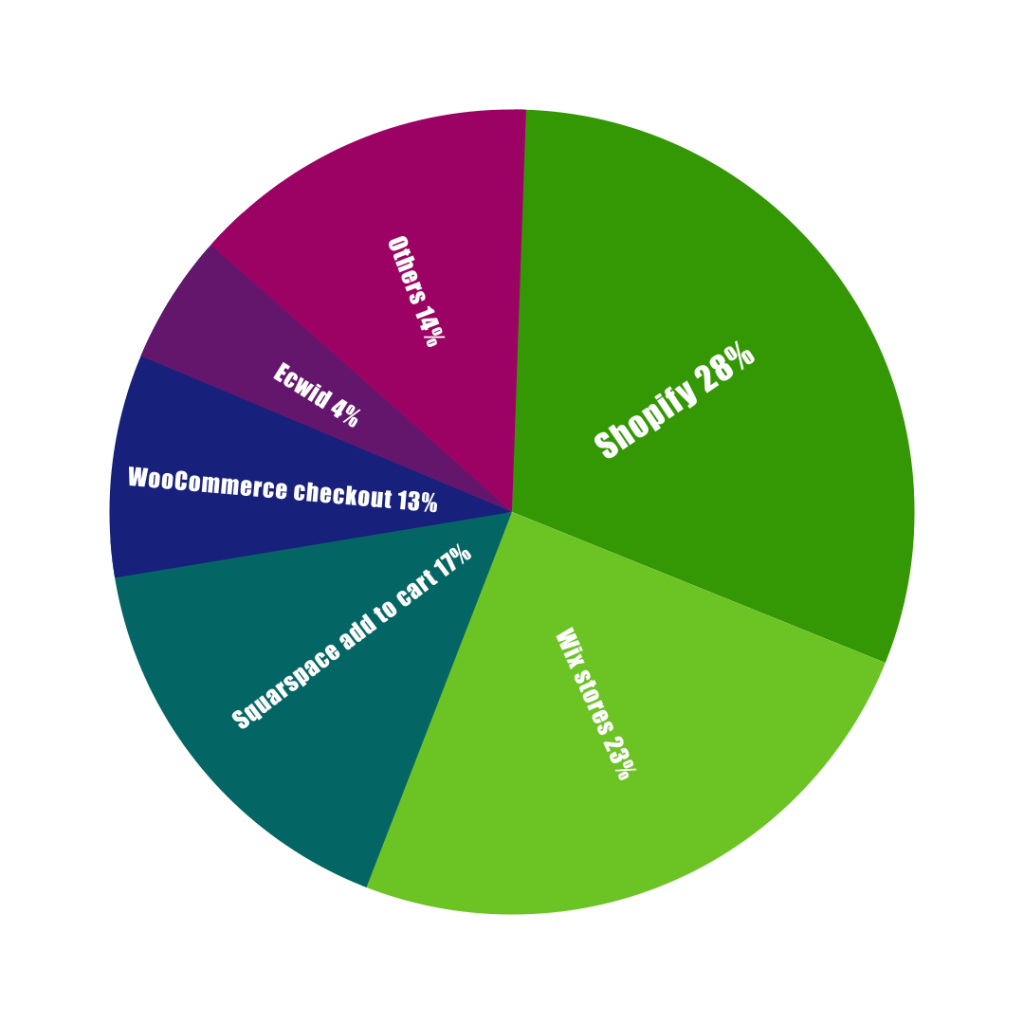
Source: https://trends.builtwith.com/shop/country/United-States
If we compare, both have their own sets of benefits. WooCommerce is mostly used on WordPress websites and is a good choice for WordPress users. But when it comes to Shopify, it’s the most common used platform by ecommerce stores.
Verdict – If we see the bigger player, then definitely WooCommerce is the winner. But if you are planning an online business and need a platform that has all the features including hosting, then go for Shopify, as it’s the most searched ecommerce platform.
Shopify Or WooCommerce? Which One is More User Friendly?
Both the platforms provide different experience, let’s compare:
Shopify – Beginner Friendly
Shopify has been considered the easiest to use and accessible platform. It provides complete hosting services which means you don’t have to worry about any technical aspects. Shopify handles everything including web hosting, domain setup, security and much more. All you need to do is create an account, pick a theme, add products, set up payment options, launch your store and boom… start selling. And don’t worry about the process, Shopify provides the complete guide so that anyone can set up the store without any technical background.
WooCommerce – Require Technical Efforts and Knowledge
WooCommerce is a WordPress plugin, which means it requires technical knowledge. To install WooCommerce plugin you are required to have a WordPress website. Also, you need to outsource the hosting and domain registration process. WooCommerce does provide the setup instructions initially for payment gateways and shipping methods, but it’s not easy, it’s complex and requires technical skills. You also need to handle the security and update all by yourself.
Verdict – Clearly, Shopify is the winner here as it’s easy to navigate and user-friendly. Shopify does not require any third-party hosting, and the platform is secure too.
Which Platform Do You Think Has Better Security?
Imagine you have a store that is not secure and you are losing your customer data. Sounds like a worst nightmare….. right? Security is important when it comes to an online store to keep your customers’ data protected and provide secure transactions to customers. Security builds trust and enhances customer loyalty. Shopify and WooCommerce provide security for your online store but in a different way. Let’s compare security measures of both the platforms:
Shopify Security
Shopify hosts thousands of online stores and takes security very seriously as it’s a dedicated ecommerce platform. It provides end-to-end security, even if you have a basic Shopify plan, you can access different security features:
- Two-Factor Authentication – Shopify supports two-factor authentication, which provides an extra layer of security during the login process. This improves the overall account security.
- Regular Security Audits and Updates – One thing about Shopify is that it conducts regular security audits to make sure that all the systems and processes are secure, up to date and meeting the industry guidelines.
- SSL Certificates and Secure Data Transmission – All the data transmitted to Shopify is encrypted and Shopify ensures this by using an SSL certificate. It’s important for the protection of sensitive customer information during transactions.
- Fraud Analysis Tools- All the data transmitted to Shopify is encrypted and Shopify ensures this by using an SSL certificate. It’s important for the protection of sensitive customer information during transactions.
- PCI-Compliant Payment Processing – Having compliance with the payment card industry data security standard (PCI DSS) is compulsory for online stores to keep the card details secure. And Shopify follows and meets the standards.
- Security Apps and CAPTCHA – Shopify makes sure to encourage store owners to install security apps against hackers and bot registrations. Add a CAPTCHA to your website to prevent spam and automated scams.
WooCommerce Security
WooCommerce is self-hosted platform, you need to install a third-party app for security features. Store owners need to manage all the security apps which require time and as well as technical knowledge. You need to select a trusted web hosting provider that also has strong security features. Check these features:
- Software: It should have an Intrusion Detection System (IDS) to block real-time threats, the latest server, and automatic malware scans.
- SSL Certificate: Data encryption is important, so look for SSL certificates and check if the app provides additional data encryption for better protection.
- Vulnerability Scans: Choose an app that regularly scans the site and shares Regular updates with you so that you can identify weaknesses and fix them before a virus attacks your website.
- Compliance Certifications: This is the most important to look for, PCI-DSS or SOC 2 for credit card and data security practices so that you can provide full security to your customers.
- Network Protection: Protect your network by adding Firewalls, DDoS mitigation and web application firewalls (WAFs).
Verdict: Shopify is much more secure than WooCommerce as it has all the safety features. But with WooCommerce, you will have to look at third-party options.
Which Platform Provide Better eCommerce Features?
| Features | Shopify | WooCommerce |
| Inventory Management | Yes, you can manage all the inventories, and also keep a sync of offline and online stock | Yes, manage your inventory easily |
| Marketplace Connections | Yes | Yes |
| Product Listing | Easily add products, descriptions, their images, pricing and much more | It has a user friendly layout for product creation |
| Product Variations | 100 variations per product | 30 variations per product |
| Point of Sale (POS) Solutions | In built POS to sell offline and also keep it connected to the online business | You can integrate it with third party POS plugins |
| One Page Checkout | It has one page inbuilt checkout | One page checkout is possible by doing integration |
| Shipping Methods | Yes, it has, but it starts from the advanced Shopify plans | For Shipping you will have to add plugin |
| SEO and Marketing | Yes, huge scope for marketing and SEO | Yes, easy to market and great SEO opportunity |
| Blogs | You can add blogs | You can add blogs and even customize the blog page |
| Social Marketing | Yes, can be done. Great strategy to boost your social presence | Yes, it can be done easily |
| Email Marketing | Yes, you can do email marketing | WooCommerce also lets you do email marketing |
| Meta Ads, Google Ads | Yes, you can easily run Meta ads and Google ads | Yes, you can run Meta ads and Google ads for more sales and leads |
| Reports & Analytics | Shopify has built in analytics features | WooCommerce has built in report and analytics features |
| Support | Shopify provides 24/7 customer support via chat, phone and email | It does not have direct support, you need to rely on community help |
Shopify and WooCommerce both provide a unique set of features which are essential for an eCommerce business. Shopify provides a user-friendly experience and has some great built-in marketing tools, whereas WooCommerce has greater flexibility for marketing and product variation with the help of plugins.
Verdict: When it comes to security, Shopify is the winner. WooCommerce, on the other hand, has one of the drawbacks that you will have to install all the security certifications on your own, and first of all, you will have to find them.
If you want to explore Shopify vs other ecommerce platforms, do check out our detailed blog here- https://www.expertvillagemedia.com/blog/shopify-vs-other-ecommerce-platforms/
Which Platform is the Overall Winner? The Final Verdict!
It’s clear that both platforms have their own pros and cons. Not all the ecommerce brands are the same and require the same features. Shopify is a great choice for businesses who are looking for an easy-to-manage, no-coding, all-in-one solution and support.
But businesses who already have technical knowledge with a good resource of developers and want extensive customizability, then WooCommerce is a good choice.
The best platform depends on your business needs and goals. The right selection will bring great results for your ecommerce business. Check growth opportunity, business goals, resources, money and all the factors, and then decide.
And if you need any help or expert guidance, then contact our experts today.
Email us at – info@expertvillagemedia.com
Call us at – +1 929 600 6830
Book a meeting with us – https://calendly.com/discuss-your-project/explore-solutions


